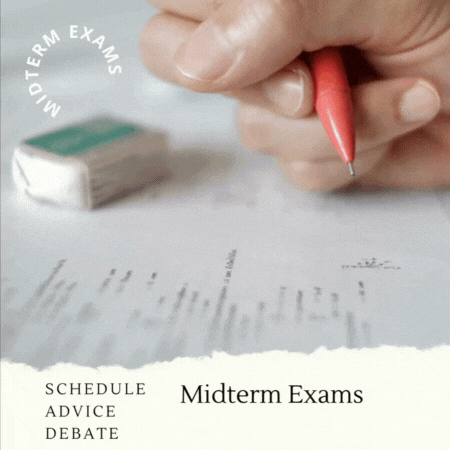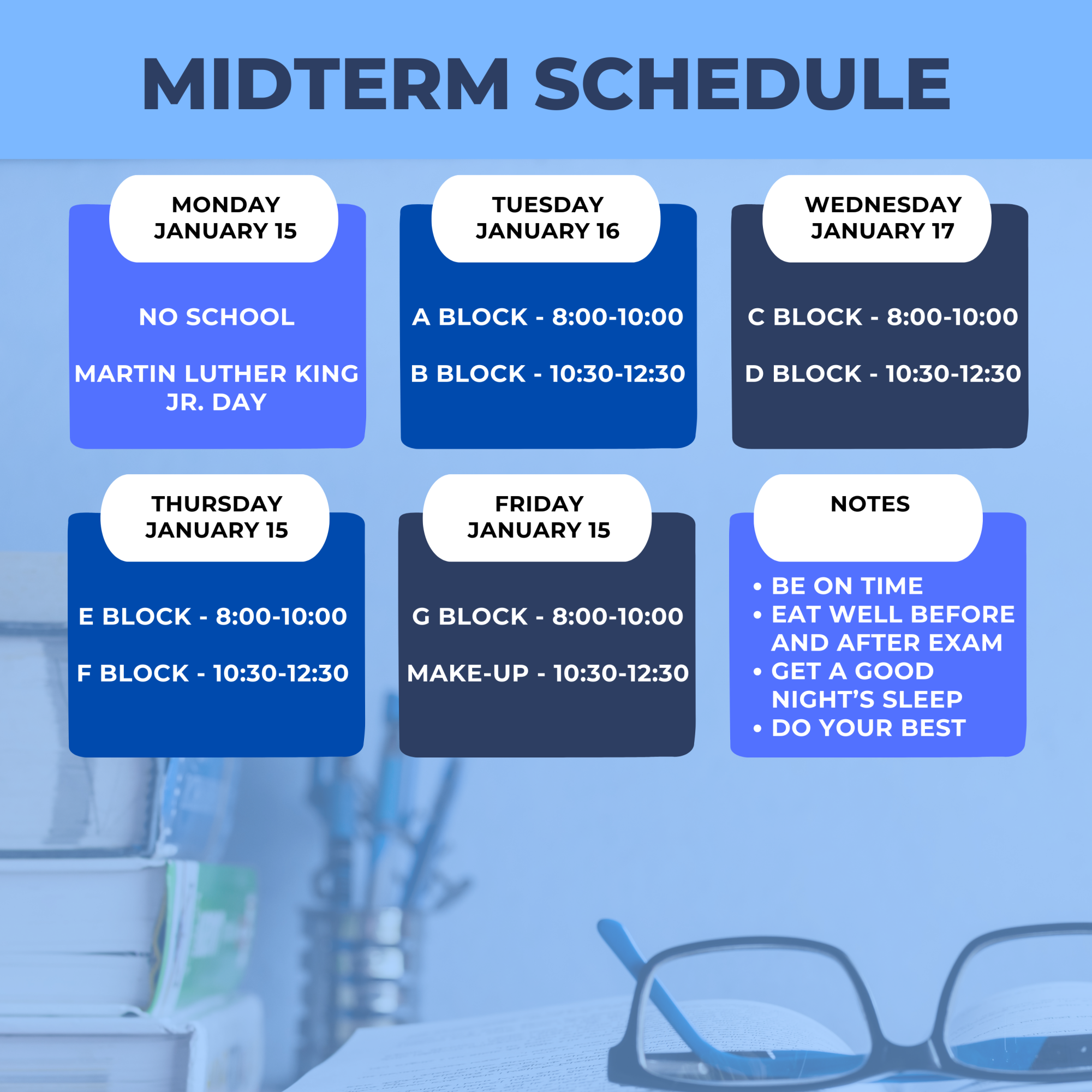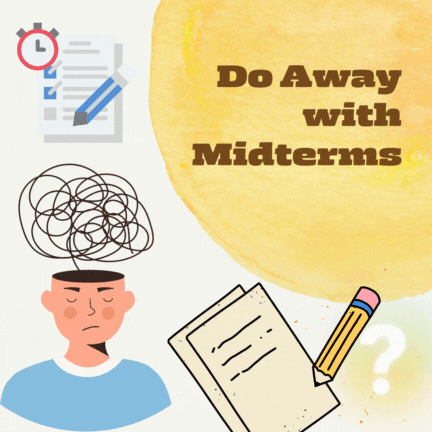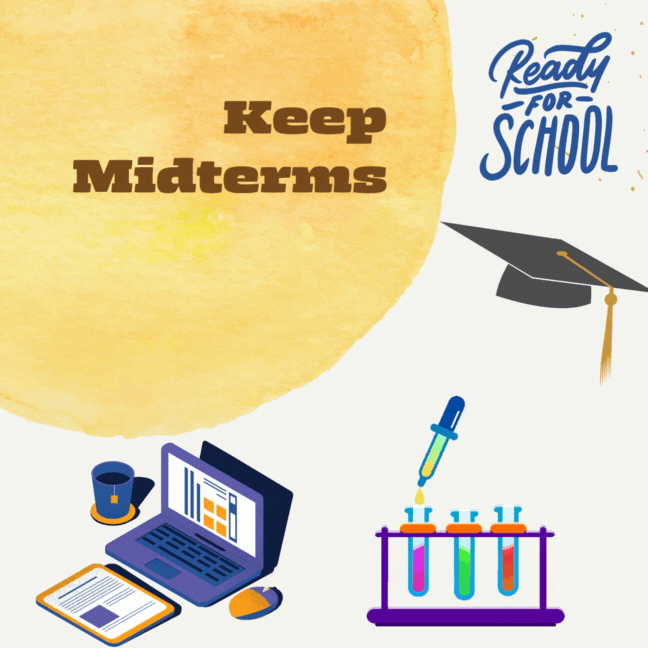

Midterms are here. Starting on the 16th and going through the 19th, the Hamilton-Wenham High School will be taking their mid-year exams. This can be a very stressful time for students. Here is some of the best advice teachers have for studying and preparing yourself.
Spanish teacher, Ms.Scarpaci, says that the best way to prepare is to “get organized early.” she also claims that when she was in high school, she used to make a “study schedule”, which really helped to keep her organized and not do too much at one time. Mr. Walsh also made a similar point by saying that he “wouldn’t try to study for all your classes in one day”. This point was also emphasized by guidance counselor, Mr. Fitzgibbons.
The main point that all the teachers made clear was that waiting until the last moment is not the right way to study, and it will not work.
Some specifics include starting the week before exams and, studying for 20-40 min each night forming study groups to quiz each other. Walsh adds that “focusing on what you don’t already know” in order to prepare is key and not to waste time on things students already know.
Though the all-night-cram session might seem like a good idea, studies show that teenagers (13-18) should be getting 8-10 hours of sleep every night. This would be near impossible if they are trying to cram multiple days worth of studying into one night as well as the fact that its much harder to retain the information they study if they’re stressed and not sleeping enough.
Research also shows that eating well before an exam can help you retain information and stay awake. The recommended foods to eat are proteins, carbs, fruits, and vegetables. A good breakfast should consist of at least one item with each of those things.
Regardless of what strategies students choose to use, the paper wishes them the best of luck with the midterms, and just remember that the sooner students start to review, the better the outcome will be.

As the midterm season approaches, students discuss sacrificing their mental well-being and sleep in the relentless pursuit of academic success. Rather than holding tests that don’t necessarily measure what students are capable of, midterms should be canceled or focus more on task-oriented projects versus rote memorization.
Midterm test preparation creates unhealthy sleeping habits, which makes students indulge in more stimulants (like coffee and energy drinks). According to the CDC, caffeine leads to dehydration, heart complications, anxiety, and insomnia. These conditions mean that midterms often don’t accurately assess someone’s academic achievement but rather their ability to handle stress.
Some would argue that midterm testing prepares students for future careers. However, many career paths use projects and rarely require their workers to take tests. For example, testing does not occur twice a year for jobs such as sales representatives, real estate agents, auditors, engineers, or firefighters.
Others claim it prepares high school students for higher education. However, colleges are leaning towards project-based testing due to design thinking, group work, and problem-solving. Northeastern University, Worcester Polytechnic Institute, and Stanford University emphasize design thinking.
Stanford has been looking further into project-based learning within their computer science classroom. They concluded, “Ultimately, this work may help us better understand some forms of human cognition because you can see what people are doing and how they are thinking in real-time.”
Many teachers feel that end-of-the-term assessments help them determine what students can retain throughout the semester. While taking advantage of tracking a student’s progress is very informative, if a student didn’t understand a unit previously, will they truly be able to master that knowledge the night before a midterm?
Last-minute cramming only affects short-term retention; therefore, spaced repetition through consistent, smaller study sessions is a more effective strategy for long-term learning. According to Colgate professionals, “You can only focus for so long before cognitive fatigue sets in after which point your ability to process and retain information starts to rapidly decline.” After you feel drowsy, the information does not stay within the human mind after a few hours, making the purpose of studying for long hours pointless.
Instead of putting a book-size test on students’ desks, schools should use projects that ensure students work together, use resources, and get real-world experience. All of these factors engage students’ full abilities and make them come out of their comfort zone while still providing data about how well they understand the large themes of a unit. By moving toward projects and away from test-based midterms, students can demonstrate more skill-based learning without the added stress and sleepless nights associated with term exams.

With Midterms just around the corner, there is chatter flowing through the school of pure hatred towards exam week and the dreadful studying process. So why do schools include them?
Midterms and Finals are seen as the best way for teachers to see the growth of students as well as their teaching styles through the semester. A large stake exam allows students to put forth their best work to be displayed to teachers. According to Kaleidoscope journalists Soraya Masrour and Claire Sloniesy, “Teachers can assess the progress of their students and areas where improvement is necessary.” Midterms and finals allow teachers to track exactly how their students have developed over the semester and determine what help they still need to be successful.
These high-stakes tests also push students to be successful. Midterms and finals often cover a wide range of units and topics. Students can see how well they have retained this knowledge on a long-term basis and make connections between units to see how the knowledge/information they have gained connects on a broader scale. For example, when teachers test from units one through five, students can determine not only how well they retained the knowledge but how that knowledge stuck with them over time. Without a midterm or final exam to display this information, it would be much harder for students to make individual progress and make broader connections.
Similarly, students can use these large-based exams in the future to better prepare themselves for anything in life that requires a wide variety of testing. According to news editor Daniel Lee, “It is very important for most high school students, who will soon be focusing on more in-depth study of a particular area, to gain study skills and habits for a big test to prepare themselves for their future.” Colleges and universities use midterms and finals as major parts of grades and success. It is essential for high schools to continue to have these exams to help prepare students for these crucial moments.
Additionally, many career paths incorporate necessary testing in order to pass and get what is needed. For example, certain certifications like marketing, first aid, and machine operating require a test to be taken that needs to be passed. Prior practice and experience in high school allow these tests to be way more reasonable.
Though midterms and finals can be stressful, instead of letting these exams consume students, these large-based exams can be seen as a way for kids to create better habits. Firstly, it helps students balance school work with personal things like sports and hobbies in a much more because it teaches kids how to deal with stress better. Additionally, it helps develop stronger study habits because students gain real-world experience studying and preparing to demonstrate their cumulative knowledge on a subject. Lastly, life is full of stressful situations. This is an opportunity to learn how to cope and thus help students prepare for the future when these hard times occur again.












